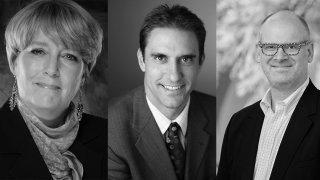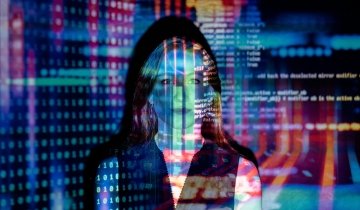Professor Melora Sundt and Associate Professors Robert Filback and Mark Robison have been instrumental in the creation of the school's new Global Executive EdD program, an innovative professional doctoral program designed to enhance the experience of senior educational leaders and policy makers. The program will be conducted with in-person sessions at USC and at Hong Kong University of Science and Technology, blended with online coursework. Sundt, Robison and Filback discussed the unique nature of the program.
Melora Sundt: As educational leaders we confront a combination of problems, some of which are enduring while others are new. These challenges exist in educational settings that are integrally tied to one another by forces that transcend any given location or setting. So the most intractable problems, the ones we have not yet been able to solve, are now combined with circumstances we have never seen before. Urban density is a good example, in that it is a long-standing issue but is increasingly complex and tied—through globalization—to similar circumstances around the globe. If we keep looking internally for solutions, we are not going to get there, because we have tried various solutions for hundreds of years. But, we are not alone. These problems that educational leaders face are not unique to a single region, and so the more we can learn from what is happening around the world, the more likely we are to find solutions. We share a lot more than we think we do, and a global perspective is a critical component in finding solutions.
Mark Robison: I think that has been the experience that all of us have had as USC Rossier becomes more and more internationally connected. Faculty participating in the international study tours and different activities comment on this, as do students on those tours. Our students are also educational practitioners, and they constantly observe the commonality of experiences between the challenges they face as leaders here and what we learn as we talk to our colleagues in countries around the world. And so I agree: these issues of population density, migration, immigration, poverty—all those sorts of issues that we would put under the heading of “urban education” here—are interconnected around the world. There are lessons to be learned and best practices to be shared when one takes a global perspective. As we created this new Global Executive EdD program, we started by thinking “what are the skills?” and “what are the sets of knowledge that people need to be leaders in the 21st century?” A lot of the answers we developed focused on understanding a broad range of educational experiences and contexts in societies around the world.
MS: We see this same approach in the way research is pursued today. The idea of looking across disciplines to find solutions rather than sticking within your silo is now well established—and this same thing exists geographically. You cannot just look for solutions within Los Angeles or the United States. The way we are addressing these issues is to harness the intelligence and experience found in places around the world that are facing similar kinds of problems.
Robert Filback: USC Rossier has made it abundantly clear that the focus here is on urban education. Urban is a global phenomenon, so urban here is urban there. We know the world is urbanizing fast, and so the problems of urban education are going to be pervasive across a lot of borders and a lot of different regional contexts. So, one critical piece for the Global Executive EdD is to look at urban issues across cultures and countries, and think about how they are the same everywhere. The other thing I would say is that the awareness of people is a lot greater now. This is an emerging trend that can be seen in school districts as well, where schools here now are compared to schools in other countries, and the reverse is true. The next generation of education leaders needs to understand this movement and bring a global perspective to their work.
Futures: Who are these individuals you plan to recruit, and what kinds of leaders will they become?
MR: The students that we have focused on have a considerable amount of professional experience. We presume they will have at least 10 years of leadership experience. It could be in a school setting. It could be in a university setting. It could be in a ministry of education, in a corporation, an NGO, or in a multilateral organization like UNESCO. Regardless, the successful candidate will be someone who is in a position of leadership who has perspective on how an organization works and the challenges an organization faces. I think a lot of students will be in the program with the support and encouragement of their employers because they are being groomed for even more senior leadership positions. But we can also envision a place in the program for somebody who has leadership experience in another sector and wants to move into education.
RF: One thing I am looking forward to is building on the notion of different sectors engaging in the program. To have people coming from the private sector or from other organizational leadership fields will provide a powerful learning opportunity. If you look at some of the most problematic situations in education, in many countries it is in some of the poorest, hardest to reach regions, where you see the private sector emerging as a real solution-maker. Collaboration across sectors in education will only grow in the future, and this program will build connections of that nature amongst the participants.
Futures: How does the curriculum contribute to the development of these leaders?
MS: We spent time talking with leaders around the world who looked like the people we wanted to recruit as well as those at the very top of their institutions, and they do not look like the students one finds in a traditional doctoral program. The things that they talk about are the things that became the four streams running through the Global Executive EdD curriculum: policy, problem solving, creativity, and understanding complexity. That is a really different lens to use for understanding education, but as soon as we started creating the program on that basis it made complete sense.
MR: And I think the ‘dissertation of practice’—the team consulting project for a client that serves as the capstone for the program—is emblematic of the appeal of the program to educational leaders. The traditional dissertation is solitary, it is isolating, and it is not reflective of the kinds of things that leaders do in educational organizations, or really any type of organization. Instead, this is very applied and very focused on a real-world issue. It is collaborative and it brings to bear the professional and academic experiences of the individuals involved. This type of dissertation experience is built around analysis and is data driven, but it is also results-oriented for the client organization. That is what leaders do.
MS: That is where this initial idea came from: how do we create an EdD opportunity that is relevant to people from anywhere in the world and accessible to people from anywhere in the world?
RF: The variety of contexts and backgrounds these students represent also means that there is going to be a multiplicity of ideologies and ways of thinking about education, and varying political and economic philosophies, within the group. As a result, the program and the students themselves need to recognize that there are different political arrangements around the world, that there are different relationships between school systems and governments, and there are different economic motivators as well. In some places schooling is very much incentivized, and in other places it is not. And private-public looks different in many parts of the world. The prevailing degree in educational leadership as you travel around the world is the PhD. Those programs bring the research orientation and valuable skills for students, but I think we have the real opportunity to set the bar in terms of what an EdD can do internationally. We have an opportunity to create leaders who bring to their work a research orientation and the problem-solving skills their organizations need. That is a big part of a leadership profile we are creating with this program.






